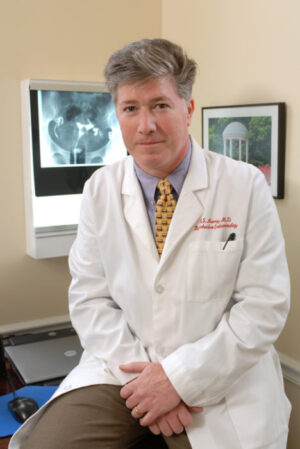Dr. Murray’s Story

If you are like my wife and me, most of the time you’ve got things pretty well covered. The world seems to run better when you’re in charge, and for the most part, things go your way.
I think that’s partly why the diagnosis of infertility was so frustrating to us. It seemed like everything about it was out of our control. To make matters worse, a lot of current medical advice encouraged patients to educate themselves about their condition. While this IS a good concept, it has a major pitfall: mainly, it gives you the sense that you do have more control over the situation than you actually do.
The more we tried to gain control of it, the more elusive getting pregnant became. The more frustrated we became.
This frustration and desire for control had many implications. I saw this as a patient and I continue to see this as a doctor.
The first casualty in this quest for control was our self-esteem.
Getting pregnant was so easy for other people. We could not go to the mall or the grocery store without feeling like we had stumbled into a stroller stampede. Happy mothers and families were everywhere.
If it was so easy for them, then something was wrong with us. We had a sense that we were somehow not worthy, or that we were being punished.
To make matters worse, during much of our journey, I was an Ob/Gyn resident. Daily, I cared for couples who seemed to take their fertility for granted. I saw women (some of them drug addicts or alcoholics) who made very unhealthy choices for their pregnancies. I saw 13-year-old girls who thought pregnancy was a perfectly normal part of adolescence.
It made me wonder what sin I had committed to make me unworthy of being a father.
This blame made us somehow doubt that any treatment would work.
Success seemed so far away.
This blame skewed our ability to interpret what the doctors told us. When we were told that an individual treatment would have a 15 percent chance of working, we somehow focused only on that 15 percent. That 15 percent received 100 percent of our attention. So when the most likely thing happened — we did not conceive — our disappointment was out of proportion to our actual chances. We thought each failure was an indictment, or a failure of the doctor.
As I sit here and write this, there are so many tangential directions I could explore. There are so many examples of how we gradually lost trust that we would ever conceive, but I won’t elaborate on them right now.
I can say that I think I know what kept us going.
First, we kept trying because despite each failure, we would have regretted not trying one more time.
Second, I knew I was not yet ready to adopt. At that time in my life, it seemed like “second best.” And as long as I felt that way, I knew that would not be fair to a child. (Of course I felt guilty about this, too, and it only reinforced my doubts about whether I was worthy.)
But ultimately, despite all the guilt, despite wondering if we were being punished, I was hopeful.
I was hopeful that our suffering was a gift.
I didn’t know what kind of gift it would be: compassion and understanding for those in my shoes; a greater love for a child (adopted or otherwise) should we ever have one; a cautionary tale for others.
In the end, I learned that no matter how much I tried, I could not control hope. It controlled me.
This was how I came to realize that hope is at once wonderful … and cruel.
Schedule an Appointment
